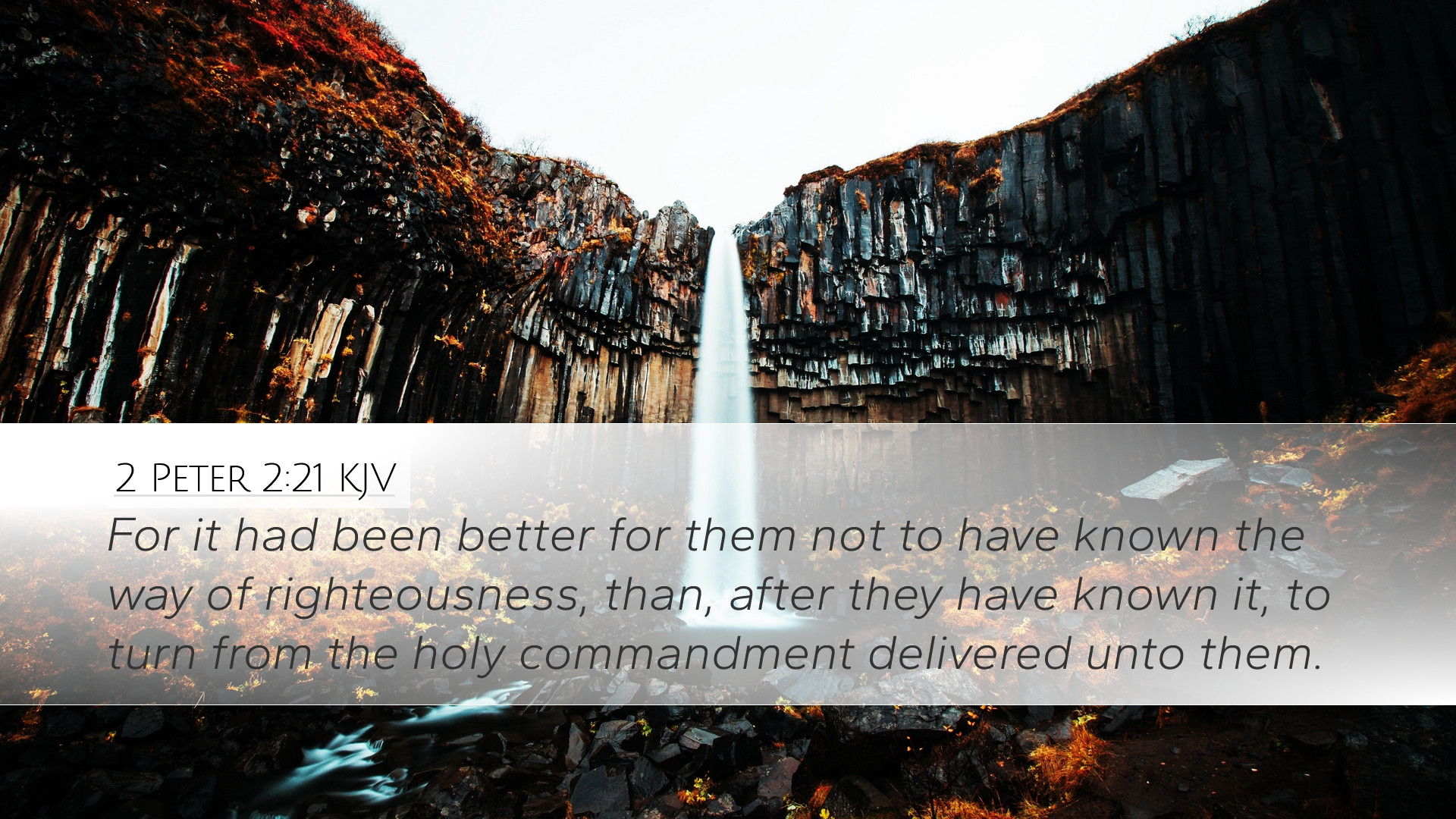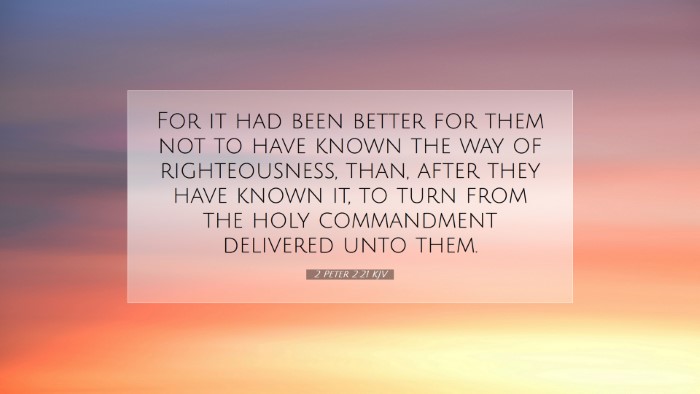Old Testament
Genesis Exodus Leviticus Numbers Deuteronomy Joshua Judges Ruth 1 Samuel 2 Samuel 1 Kings 2 Kings 1 Chronicles 2 Chronicles Ezra Nehemiah Esther Job Psalms Proverbs Ecclesiastes Song of Solomon Isaiah Jeremiah Lamentations Ezekiel Daniel Hosea Joel Amos Obadiah Jonah Micah Nahum Habakkuk Zephaniah Haggai Zechariah Malachi2 Peter 2:21
2 Peter 2:21 KJV
For it had been better for them not to have known the way of righteousness, than, after they have known it, to turn from the holy commandment delivered unto them.
2 Peter 2:21 Bible Commentary
Commentary on 2 Peter 2:21
Verse Context: 2 Peter 2:21 states, "For it had been better for them not to have known the way of righteousness, than, after they have known it, to turn from the holy commandment delivered unto them." This passage is a part of a larger discourse warning against false teachers and the grave consequences of turning away from the truth of the Gospel.
Introduction
The epistle of 2 Peter is primarily concerned with the dangers posed by false prophets and teachers. The author, traditionally understood to be the Apostle Peter, seeks to reaffirm the truth of the Gospel while warning against the corruption introduced by these deceivers.
The Seriousness of Apostasy
Albert Barnes emphasizes that apostasy—turning away from a previously accepted truth—holds severe implications. In this context, to know the way of righteousness entails a covenant relationship with God, therefore, turning away signifies a deliberate rejection of that relationship. The term "better" speaks to the stark reality that ignorance could lead to lesser accountability.
The Knowledge of Righteousness
Matthew Henry notes that knowledge of righteousness is not merely intellectual assent but involves a transformative relationship with God. Those who have experienced the grace of God and tasted the goodness of His Word are under greater condemnation should they fall away, as they have firsthand understanding of God’s ways.
The Consequences of Turning Away
Adam Clarke provides further insight into the gravity of this warning. When one has been enlightened to the truth of Christ and then chooses to reject that truth, the consequences are dire. He suggests that such individuals face a unique kind of loss—not just the loss of faith but the loss of the hope that accompanies the knowledge of righteousness.
The Holy Commandment
The "holy commandment" refers to the principles and teachings of Christ that govern the Christian life. Henry explains that this commandment demands sanctity, moral integrity, and a pursuit of holiness. To turn from it is to embrace a path that is fundamentally misaligned with God’s purposes.
Comparison to the Old Testament
Barnes draws parallels to the Old Testament, particularly the rebellious Israelites who, after experiencing God’s deliverance, chose to revert to their former ways. This historical account serves as a cautionary tale illustrating the long-standing principle of accountability linked to the knowing of divine truth.
Implications for Today’s Church
This verse serves as a solemn reminder to contemporary believers about the seriousness of faith. Clarke asserts that those in positions of spiritual leadership must be particularly vigilant. The allure of false teachings can lead even the elect astray if they are not firmly rooted in the truth of Scripture.
- Faithfulness: Believers are called to cling to their faith and reinforce it through study and prayer.
- Community: The importance of communal accountability to prevent drifting away from core truths cannot be underestimated.
- Education: Understanding the doctrines of the faith is crucial for recognizing error when it arises.
Final Reflections
In sum, 2 Peter 2:21 encapsulates a vital truth: knowing God’s way comes with irrevocable responsibility. Henry concludes that the greatest tragedy is not merely falling away but the knowledge of what has been forsaken—a profound truth echoed throughout Scripture. This passage serves as a compelling exhortation for all believers to remain steadfast, to dive deeper into the richness of God’s Word, and to heed the warnings of Scripture about the perils of apostasy.


